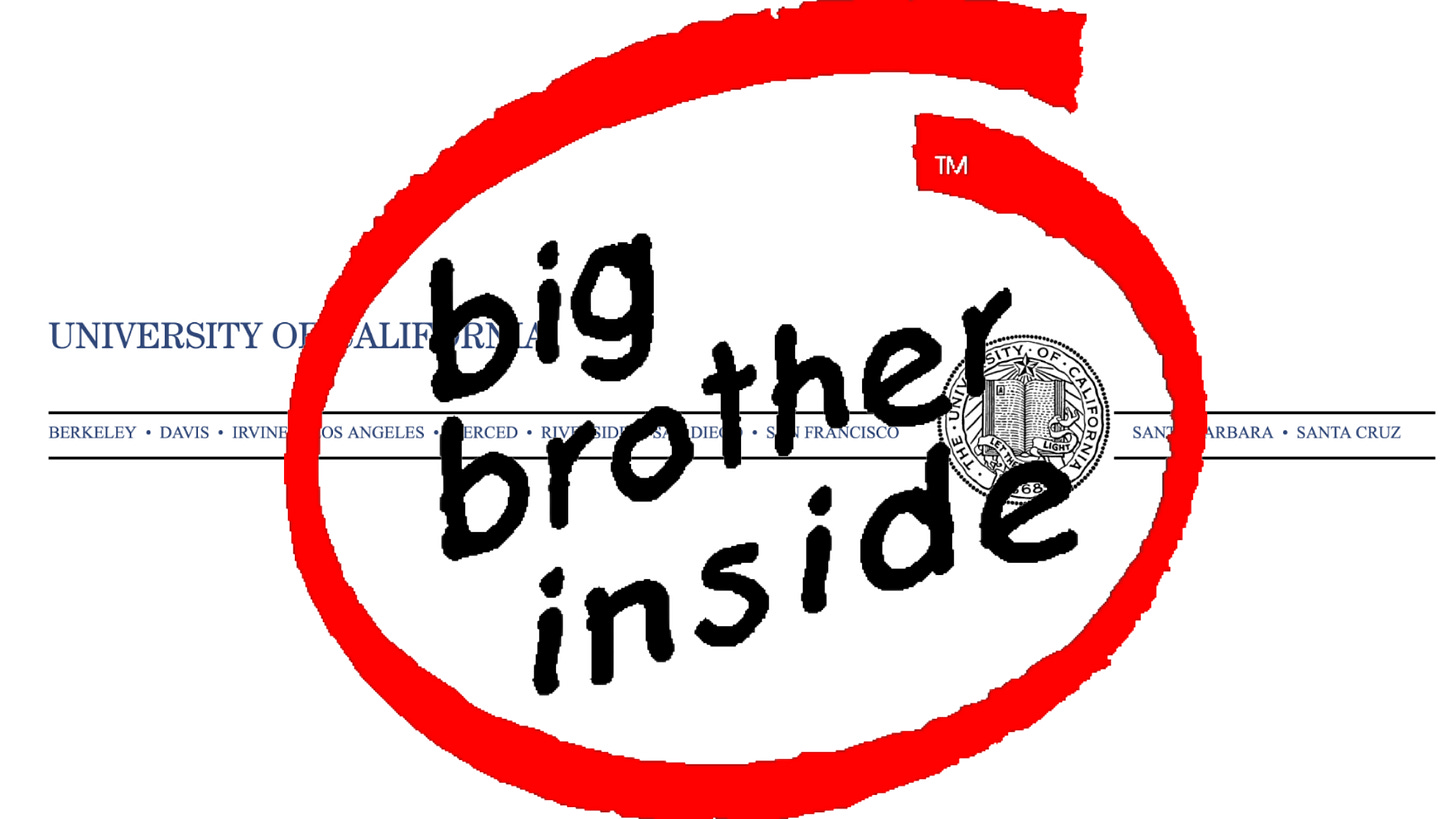UC Gives Trump Administration Access to All Faculty Computers
In an era of federal investigation and prosecution of political opponents, UC hands the keys of faculty computers to the Trump administration.
The University of California, long a beacon of public higher education and research excellence, has taken a wholehearted leap to submission to the authority of the Trump administration. The UC Office of the President (UCOP) has mandated the installation of Trellix Endpoint Detection and Response (EDR) software on faculty computers. This step undermines the very foundation of academic freedom, privacy, and shared governance.
A Dangerous Precedent
Trellix EDR is not a basic form of security software. It grants itself unrestricted, root-level access to faculty computers, scanning all files, logging metadata, quarantining material, and even uploading content deemed “suspicious”—all without user consent. This level of surveillance is unprecedented in UC’s history and represents an existential threat to the independence of research and teaching.
Faculty across the UC system have been clear: this is not acceptable. On June 12, 2025, the systemwide Academic Senate passed a resolution by an overwhelming 82% supermajority demanding an immediate halt to the implementation of Trellix. Earlier, faculty senates at UC Berkeley, UC Irvine, UC Santa Barbara, and UC Riverside expressed similar objections through letters and resolutions. The Council of UC Faculty Associations sent a letter to former President Drake requesting, among other items, for these cybersecurity changes be subject to a process of approval in accordance with AAUP’s recommendations regarding Academic Freedom and Electronic Communications, and for Academic Senate to be recognized as the decision making authority on this academic matter. Over 1,000 faculty signed a petition opposing the rollout, and 633 faculty members, including leaders from multiple campuses, sent a direct letter to incoming UC President James Milliken urging him to stop the program, as he was newly incoming as of August 1.
Yet UCOP has pressed forward.
Handing the Keys to Washington
The danger extends well beyond UC administrators or Trellix employees peering into faculty work. Trellix participates in the Joint Cyber Defense Collaborative (JCDC), a federal task force that includes the Department of Homeland Security’s Cybersecurity and Infrastructure Security Agency (CISA). By design, JCDC facilitates “rapid bilateral and multilateral threat information sharing” between private companies and the federal government.
In practical terms, this means that sensitive faculty data—including unfinished manuscripts, confidential peer reviews, private communications, politically sensitive analyses, or health data covered by privacy protections—could be shared with federal agencies, without a warrant. In an era where federal investigative and prosecutorial powers are increasingly used against its perceived political opponents, this creates a chilling risk: UC faculty could find their research or communications weaponized by the Trump administration.
The precedent is alarming. Trellix’s predecessor, FireEye, was hacked in the 2020 SolarWinds cyberattack, which compromised more than 250 federal agencies. Centralizing vast troves of UC’s intellectual life under one vulnerable surveillance system invites disaster.
Silence from the Administration
Faculty have not been silent. In a letter to UCOP in August, I and hundreds of colleagues asked for an update from the incoming UC President James Milliken on UC’s response to the June Academic Senate resolution demanding a halt to the mandated implementation of Trellix or similarly invasive software. The letter underscored that this mandate puts the full scope of faculty work under the potential scrutiny of IT staff, corporate contractors, and—most significantly—federal law enforcement. In the only response the faculty received, the current Chair of the systemwide Academic Senate, Ahmet Palazoglu, has told the hundreds of faculty signing on to the letter that President Milliken will not be responding to it. Chair Palazoglu also indicated he himself will take no steps to halt coerced implementation of the software, though his own body, the Senate, has overwhelmingly directed the halt through its resolution in June. UC’s and the Academic Senate Chair’s refusal to respect the Senate’s resolution is a violation of shared governance; and, more importantly, it is an existential threat to academic freedom.
The administration’s silence is deafening. Despite overwhelming faculty opposition, UCOP has continued expanding Trellix’s role, with UC Irvine and other campuses tying access to core systems—such as Canvas, reimbursements, and timesheet submissions—to installation of the software. Faculty are being coerced into handing over their intellectual lives to a system they did not choose, and which their Academic Senate representatives explicitly rejected.
What’s at Stake
America has become the beacon of a thriving, free, open society due, in large part, to the vibrant academic environment at its flagship universities like the University of California. At stake is whether the University of California will remain a place where independent thought thrives—or whether it will become an extension of federal surveillance infrastructure, handing over faculty research and communication to agencies that may, under an increasingly authoritarian government, weaponize that access.
Faculty at UC produce Nobel Prize-winning science, cutting-edge technological innovation, sensitive health research, and politically consequential analyses. These works must be shielded from intrusion—not handed over to intrusive IT, and especially not to the increasingly authoritarian Trump administration. In a time that Title VI prosecutions are weaponized by the federal government against its perceived political opponents in higher education, this unfettered access to faculty computers is incredibly alarming.
The Academic Senate has spoken. The faculty have spoken. UCOP must listen and stop this mandate. Interestingly this mandate does not apply to graduate students, postdoctoral scholars, and lecturers, who are part of collective bargaining unions that have the power to protect its members, a power the Academic Senate does not have. This begs the question if UC faculty should unionize. By not listening to the clear direction of faculty, UC administration abdicates its responsibility to protect academic freedom, the privacy of its scholars, and the integrity of the institution itself.

